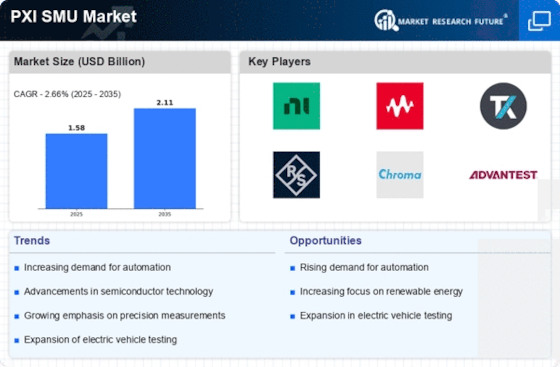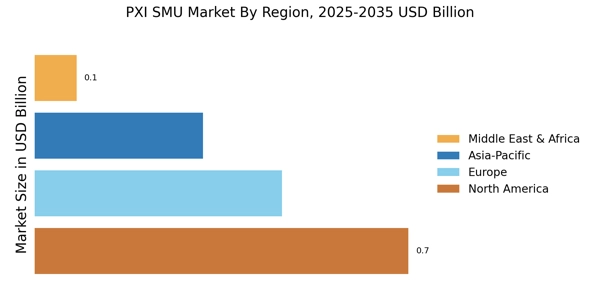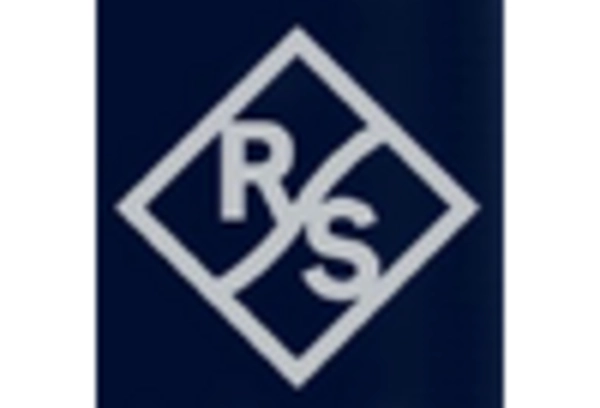Expansion of PXI SMU Applications
The PXI SMU Market is witnessing an expansion of applications across various sectors, including telecommunications, automotive, and renewable energy. As industries increasingly recognize the versatility of PXI SMUs, their adoption is becoming more widespread. For instance, in telecommunications, PXI SMUs are utilized for testing communication devices, ensuring compliance with stringent standards. In the automotive sector, these instruments are essential for testing electric vehicle components, which are becoming more prevalent. Market projections suggest that the application of PXI SMUs in renewable energy, particularly in solar and wind energy systems, is likely to grow as the demand for sustainable solutions increases. This diversification of applications not only broadens the market's reach but also enhances the relevance of PXI SMUs in addressing contemporary challenges faced by various industries.
Growing Emphasis on Research and Development
The PXI SMU Market is witnessing a growing emphasis on research and development (R&D) as organizations seek to innovate and improve their testing capabilities. Increased investment in R&D is particularly notable in sectors such as aerospace, automotive, and consumer electronics, where the demand for high-performance testing solutions is critical. Companies are allocating significant resources to develop next-generation PXI SMUs that offer enhanced features, such as higher voltage and current ranges, improved resolution, and faster measurement speeds. Market analysis indicates that R&D expenditures in the PXI SMU sector are projected to rise, reflecting the industry's commitment to advancing technology. This focus on innovation not only drives the development of more sophisticated testing solutions but also positions companies to better meet the evolving needs of their customers, thereby fostering growth within the PXI SMU Market.
Technological Advancements in PXI SMU Market
The PXI SMU Market is experiencing a surge in technological advancements, particularly in the areas of precision measurement and automated testing. Innovations in semiconductor technology and integrated circuits are enhancing the performance of PXI SMUs, allowing for higher accuracy and faster data acquisition. As industries increasingly adopt these advanced systems, the demand for PXI SMUs is projected to grow. According to recent data, the market is expected to witness a compound annual growth rate of approximately 8% over the next five years. This growth is driven by the need for sophisticated testing solutions in sectors such as telecommunications, automotive, and aerospace, where precision is paramount. The integration of artificial intelligence and machine learning into PXI SMUs further indicates a trend towards smarter testing solutions, thereby expanding the market's potential.
Rising Demand for Automated Testing Solutions
The PXI SMU Market is significantly influenced by the rising demand for automated testing solutions across various sectors. As companies strive to enhance efficiency and reduce operational costs, the adoption of automated testing systems is becoming increasingly prevalent. This trend is particularly evident in the electronics and telecommunications industries, where the complexity of devices necessitates advanced testing methodologies. Market data suggests that the automation segment is expected to account for a substantial share of the PXI SMU Market, driven by the need for rapid testing cycles and improved accuracy. Furthermore, the integration of PXI SMUs with automated test equipment (ATE) is likely to streamline testing processes, thereby reducing time-to-market for new products. This shift towards automation not only enhances productivity but also aligns with the industry's focus on quality assurance and reliability.
Increased Adoption in Educational Institutions
The PXI SMU Market is experiencing increased adoption within educational institutions, particularly in engineering and technology programs. As academic institutions strive to provide students with hands-on experience in advanced testing methodologies, the integration of PXI SMUs into curricula is becoming more common. This trend is driven by the need to equip future engineers with the skills necessary to operate sophisticated testing equipment. Market data indicates that educational institutions are investing in PXI SMUs to enhance their laboratories and research facilities, thereby fostering a new generation of skilled professionals. Furthermore, partnerships between educational institutions and industry players are likely to emerge, facilitating knowledge transfer and innovation. This growing emphasis on practical training and research in academia is expected to contribute positively to the PXI SMU Market, as it cultivates a skilled workforce that can drive future advancements.

















